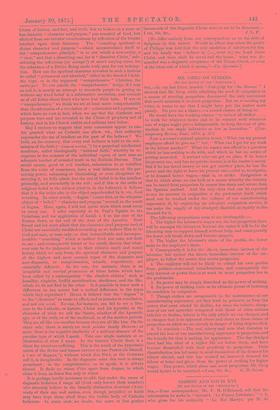MR. GREG ON STRIKES.
[To THE EDITOR OF THE"SPECTATOR."] Sin,—In my last letter, headed " Fair-p!ay for 'the Masses,'" I showed that Mr. Greg, while admitting the need of emigration as a means of averting pauperism, denounced the only movement that could maintain it or avert pauperism. But on re-reading my letter, it seems to me that I might have put the matter more plainly. Do give me a chance, —a second chance of doing so.
He would have the working-classes " to eschew all strikes . . . . to work for whatever hours and to be content with whatever rate of wages might prove indispensable to keep the cost of pro- duction in our staple industries as low as heretofore." (Con- temporary Review, June, 1874, p. 59.)
Now a servant's natural question is not, " What can my present employer afford to give me?" but, "What can I get for my work in the labour market ?" What his master can afford is a question which he has nothing to do with, and which he has no means of getting answered. A servant who can get no place if he leaves his present one, and has no private means, is at his master's mercy. But if he has saved money or can get another place, he has the power and the right to leave his present one,—that is, to migrate, or to demand better wages,—that is, to strike. Emigration is that to which alone we can look as a means whereby the country can be saved from pauperism by means less sharp and severe than the Spartan method. And the only class that can be expected to see its account in emigration is the proletariat itself, which need not be crushed under the collapse of our manufacturing supremacy, if, by organising an adequate emigration service, it can make the supply of day-drudgery diminish as rapidly as the demand for it.
The following propositions seem to me irrefragable :-
1. The higher the labourer's wages are, the less pauperism there will be amongst the labourers, because the easier it will be for the labouring man to support himself without help, and consequently the fewer will break down and become paupers.
2. The higher the labourer's share of the profits, the lower must be the employer's share.
3. Consequently it is for the direct, immediate interest of the labourer, but against the direct, immediate interest of the em- ployer, to follow the course that averts pauperism.
4. The employer will not be likely to curtail his own profits from politico-economical considerations, and consequently the only interest or power that is at work to avert pauperism lies in the proletariat.
5. Its power may be simply described as the power of striking.
6. Its power of striking rests on its ultimate power of bettering its condition by emigration.
7. Though strikes are antagonistic to the maintenance of our manufacturing supremacy, yet they tend to preserve us from the misery that must attend its decline, for since the relative cheap- ness of our raw materials compared with those of other nations bids fair to decline, labour is the only article we can cheapen, and to cheapen that is to approach closer and closer to those shores of pauperism on which we are already in danger of being shipwrecked.
8. To conclude :—The real misery and ruin that threaten to attend the loss of our manufacturing supremacy is pauperism, and the remedy for that is making its appearance. The day-drudges have had the ideal of a higher life set before them, and have become dissatisfied with their proclivity to pauperism. Their dissatisfaction has led many to avail themselves of the demand for labour abroad, and this has created an increased demand for labour at home and given them the power of striking for higher wages. This power, which alone can avert pauperism, Mr. Greg
would forbid to be exercised.—I am, Sir, &c., G. D. SNOW.


































 Previous page
Previous page